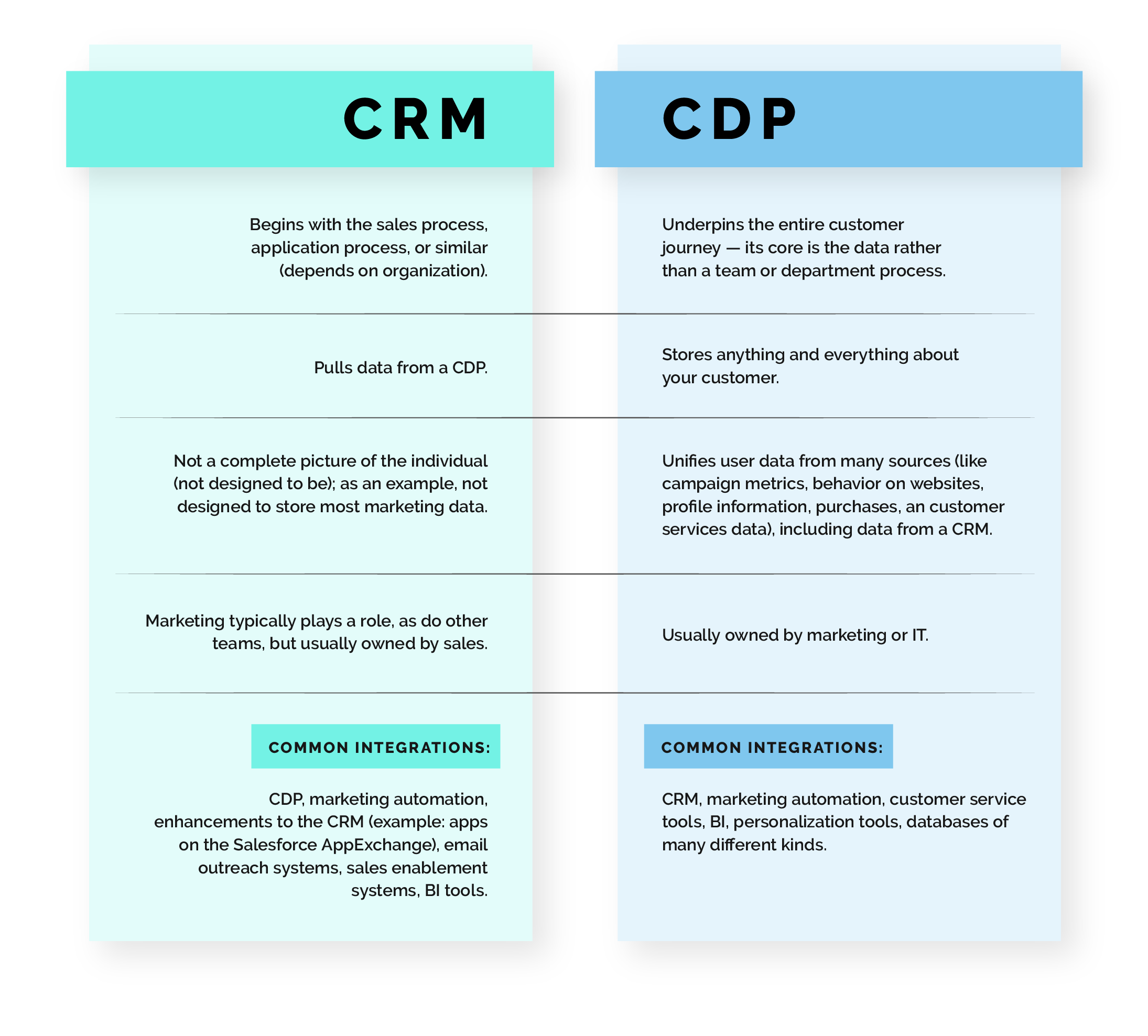Do You Really Need a CDP? Here’s Why Your CRM Might Be Good Enough.
Do You Really Need a CDP? Here’s Why Your CRM Might Be Good Enough.
Karina Schuelke | Director of Digital Strategy
April 22, 2020
We live in a moment where marketers want, need, and demand ways to bring their customer data together into a single, unified view.
Enter the CDP (Customer Data Platform), a “packaged software that creates a persistent, unified customer database that is accessible to other systems.” CDPs present an incredibly powerful opportunity to make a real difference to your data by providing a comprehensive, “single source of truth” view of your customer.
With such a powerful category of tool on the market, should marketers ALWAYS select a CDP when they are looking for a way to create that single source of truth on their customers?
Put simply - NO.
A CDP is only one of the many solutions to creating a “single source of truth.” A CRM is a common alternative.
A CDP is not a CRM
First, it’s important to state that the two systems are definitely not equivalent. A CDP we’ve already defined. There are many definitions of CRMs flying around. Some make a CRM sound like a CDP even though it’s a different type of tool, so let’s state the difference in plain terms.

With such different technologies, why would you choose the CRM to be your single source of truth instead of a CDP? They clearly don’t do the same thing; even with a built-out, heavily customized CRM, it won’t handle the same things the CDP could accomplish.
A Single Source of Truth on a Customer
This is what it’s all about - that single source of truth. A CDP makes a ton of sense when you have a huge amount of data to normalize across a wide variety of systems gathering data on the same individual in very different ways. For instance, if you’re collecting personal data, marketing behavior data, and customer service and support data, both online and offline across devices and channels AND your organization wants and needs to use this data in a variety of different ways.
Another good use for a CDP is the management of data in compliance with GDPR and CCPA. The ability to store and locate customer data spread across a wealth of different systems is invaluable in this situation.
But what if that’s not your situation?
Enter the CRM
The single source of truth is what matters. You just need to get it in a way that works for your organization. From this perspective, a CRM may be the right choice.
Here are some of the reasons why this might make sense:
- If you don’t need all the data a CDP can provide to run your organization successfully
- If you just need a place to manage your sales pipeline
- If you are happy with the CRM reporting functionality, or your CRM integrates well with a BI tool you like
- If your organization requires a minimal amount of normalization across your technology stack
Also, don’t fall into the trap of thinking more data equals better insights and results.
If you have too much data, it can actually make it harder for you to respond to your customers appropriately, meet their needs, and run your business. You can make incorrect assumptions based on spurious data, or just lose the ability to see the forest for the trees. Additionally, with GDPR and CCPA and other privacy regulations, you don’t want to collect data you don’t need, and you want to be certain the data you do collect complies with all of the regulations, which means you need to be able to manage it effectively.
For any of these and potentially other reasons as well, it may be worth turning your CRM into, if not truly a CDP, a very real source of truth on your customers and a powerful database for your business to leverage as you strive to achieve your organizational goals.
So, You’re Sticking With Your CRM
If your CRM becomes your single source of truth, one important consideration is the add-ons that can make it the most effective single source of truth for your business. Maybe you’re considering an identity management system - could your CRM become the database that integrates with it? What kinds of modifications or additions would make your CRM maximize its functionality to deal with privacy considerations like CCPA and GDPR? These types of questions will guide you to ensure that your CRM is well-tuned for your organizational needs as you modify it to become your single source of truth for customer data and insights.
Remember
The key is finding a way to achieve a real source of truth on your customers, aligned to your business needs. Stay focused on that and the right technology for your organization will become apparent.
Want to learn how to ensure your martech stack aligns with your organizational goals? Watch our on-demand webinar for helpful tactics to solve one of the most common marketing problems our team encounters!

